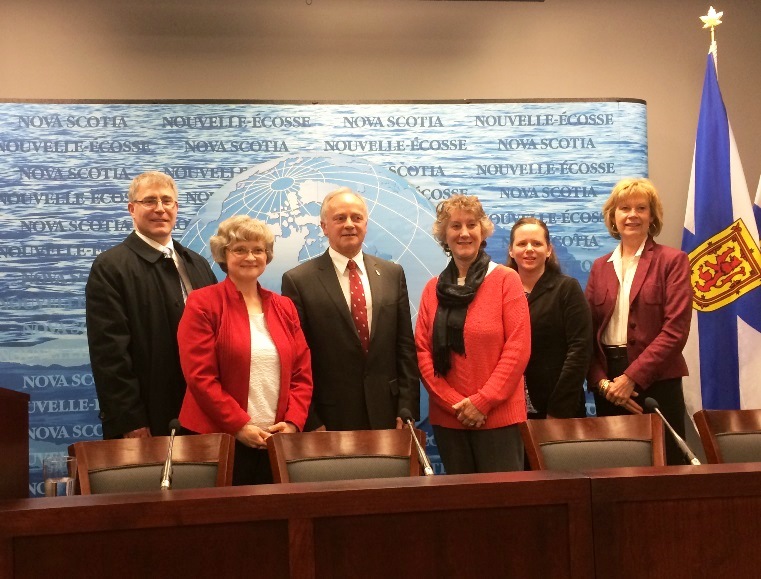Archived SCSD News
2022
SCSD Professor Receives Belong Fellowship Award
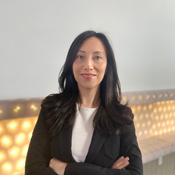 Our very own Dr. Ana Maria Gonzalez Barrero was one of this year's recipients of ¶¶ŇůĘÓƵ's Belong Fellowship Awards for 2022.
Our very own Dr. Ana Maria Gonzalez Barrero was one of this year's recipients of ¶¶ŇůĘÓƵ's Belong Fellowship Awards for 2022.
Officially launched in November 2018, Belong Research Fellowships were established by the Offices of the Provost and Vice President Academic and Vice President Research and Innovation to support tenure-track faculty from equity-deserving groups to pursue small research projects of one to two years.
Up to four fellowships of $5,000 are provided annually. You can read the entire article here.
(Andrew Riley, Dal News)
2021
The Importance of Professional Development Opportunities Outside the Classroom
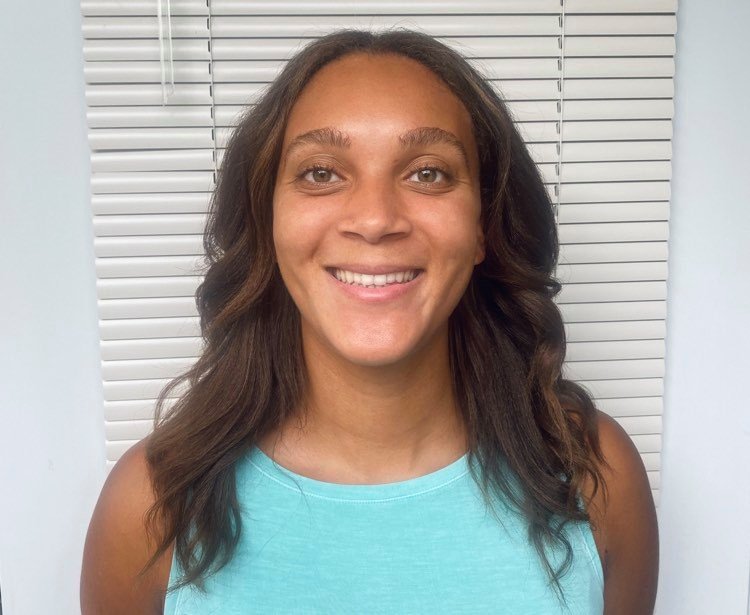 Second-year SCSD speech-language pathology student Halle Loyek shared her experience of gaining professional development outside the classroom, an opportunity supported by Johnson Scholarship Foundation!
Second-year SCSD speech-language pathology student Halle Loyek shared her experience of gaining professional development outside the classroom, an opportunity supported by Johnson Scholarship Foundation!
.
(Angie Francalancia, Johnson Scholarship Foundation)(Photo: Global Health Office, Dalhousie)
2020
SCSD Offers Five Renewable Entrance Scholarships for Academic Excellence
The School of Communication Sciences and Disorders is proud to announce that it will be offering five renewable entrance scholarships for academic excellence. Three scholarships are open to all applicants.
In addition, two more are open to Indigenous and/or African Nova Scotians including the Nova Scotia Scholar Award.
With the generous support of an endowment, Hearing and Speech Nova Scotia has provided funding of the Nova Scotia Scholar award. Please see Part V of the for more information.
Statement on Anti-racism and Anti-oppression
The ongoing violent attacks on and deaths of Black, Indigenous, and other People of Colour (BIPOC) at the hands of the police in the United States and Canada have highlighted the need to speak out and act in meaningful ways to bring about systemic change.
The School of Communication Sciences and Disorders affirms its opposition to all forms of oppression, racism, and discrimination and states clearly and unequivocally that Black Lives Matter and Indigenous Lives Matter. We pledge to scrutinize and change our policies and practices in order to eliminate systemic racism and discrimination in our School and achieve true diversity, inclusivity, equity, and cultural safety. This work is consistent with our strategic plan and core values. As first steps we will immediately engage in the following activities:
- Evaluate the admissions requirements—particularly the use of GRE scores—and revise so as to seek to eliminate systemic biases in the admissions process;
- Review the Equity Admissions Policy and potentially expand it to include other marginalized groups;
- Prioritize equity and diversity when hiring;
- Develop a process for compensating BIPOC students, alumni, and external experts who are asked to consult with us on issues of diversity, oppression, racism, and discrimination;
- Evaluate and improve how diversity is addressed in the curriculum;
- Provide anti-oppression and trauma-informed training to faculty and staff;
- Develop and implement a plan to support the success of BIPOC students in the program;
- Dialogue with other speech-language-pathology and audiology organizations about dismantling systemic racism and promoting equity in the professions and in our services such as Speech-Language and Audiology Canada (SAC), Canadian Academy of Audiology (CAA), Nova Scotia College of Audiologists and Speech-Language Pathologists (NSCASLP), Hearing and Speech Nova Scotia (HSNS), and Regional Centres of Education;
- Engage in meaningful respectful discussions with BIPOC consultants, students, staff, and faculty to identify further actions that can bring about substantive change. The action plan will be completed by December 2020;
- Inform students, faculty, staff, and other stakeholders monthly on our progress.
2019
Highlights from Convocation 2019
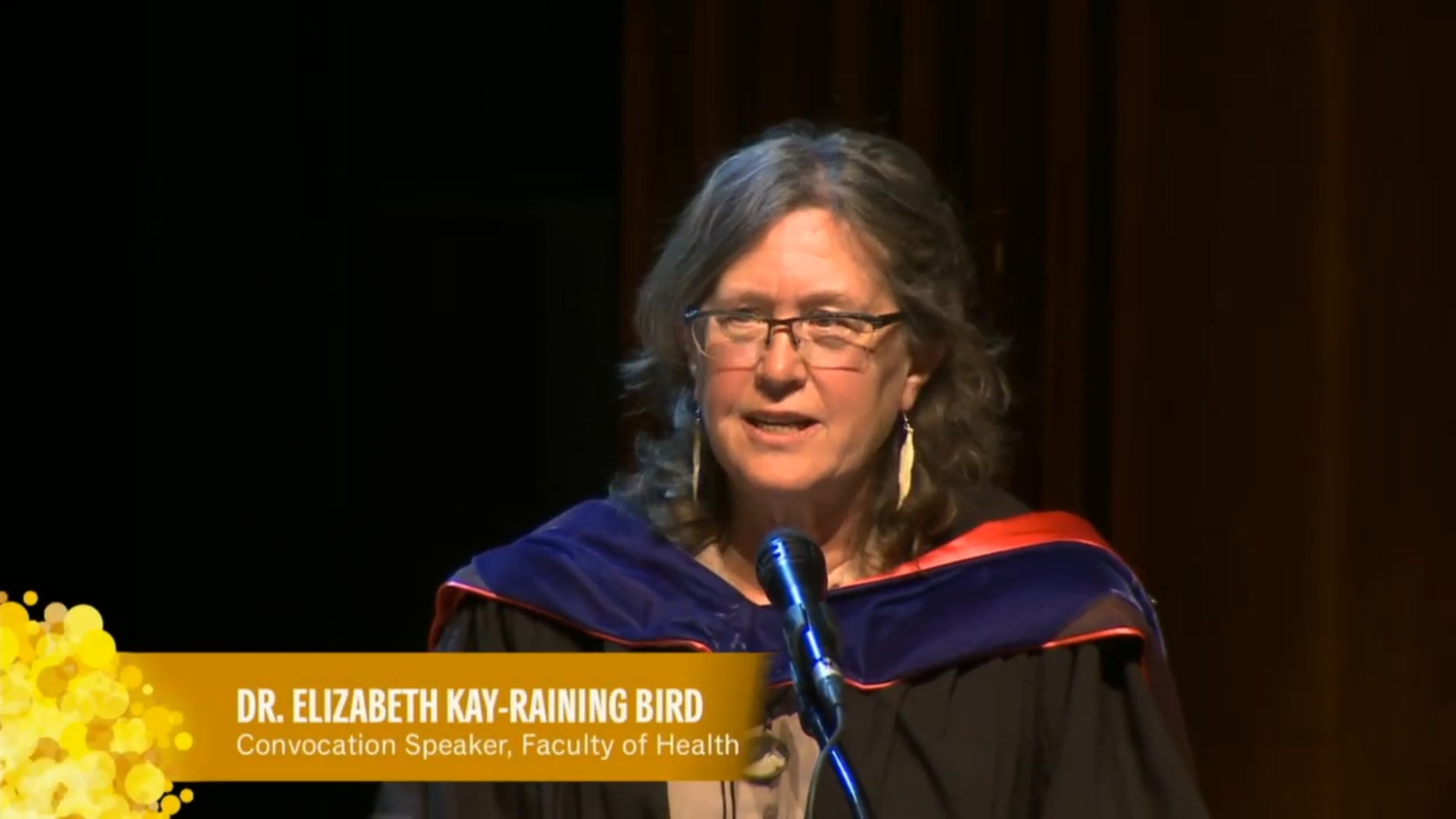 Thursday's ceremonies featured the participation of 22 members of our 2019 graduating class as well as one of our professors, Dr. Elizabeth Kay-Raining Bird giving the Convocation Address.
Thursday's ceremonies featured the participation of 22 members of our 2019 graduating class as well as one of our professors, Dr. Elizabeth Kay-Raining Bird giving the Convocation Address.
As well, one of our graduating students, Alison Bartlett, was featured in the Dal News.
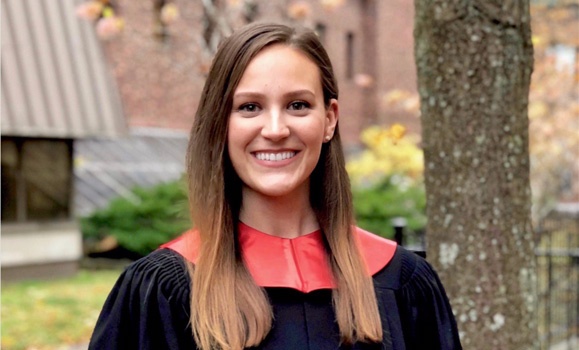
Alison Bartlett is graduating from the School of Communication Sciences and Disorders this week. We sat down for a conversation about her experience and what's next.
What is the most exciting thing about graduating?
Being able to apply everything I’ve learned in the program so that I can start making a difference in people’s lives. It feels almost surreal to finally be able to call myself an Audiologist!”
What will you miss most about Dal and your program?
“Definitely the people! Our program is very small and you end up spending a lot of time together over the course of three years, so we became more of a family than classmates. Also, the faculty and staff are exceptional and they truly want you to succeed. I’m really going to miss all of their support and guidance.”
I understand you are now working at your placement. Can you describe your placement experience and how you benefitted from it?
“Yes, I am! I could not have asked for better placement experience. My Clinical Educator provided me with enough independence to learn and grow more confident in my skills, but also endless amounts of support, guidance, and encouragement when I needed it. I think that the course work in school is fundamental is gaining the knowledge that you need to be successful, but the biggest benefit of my placement experience was learning how to apply that knowledge to real-world situations.”
Where are you from originally and what brought you to Dal?
“I’m originally from Nashwaak Bridge, New Brunswick. When I started researching Universities that offered an Audiology program, Dal was at the top of my list. I had heard a lot of great things about the program from previous Dal graduates and loved that they also include a research project as part of the degree.”
Ěý
What are some of your fondest memories looking back on your time at Dal?
“In October, we were fortunate enough to get to go to Niagara Falls for the Canadian Academy of Audiology (CAA) conference. It was such a great experience! I think another would have to be our research project presentation day. It was so fun and exciting see everyone present their hard work!”
What’s next for you?
“Very exciting things! I am so fortunate to be working as an Audiologist for Hearing Institute Atlantic! They have provided me with an incredible opportunity that will allow me to fulfill my dream of providing audiological services to more rural communities.”
SCSD Student Makes Finals for Dalhousie's 2019 Annual 3MT Competition!
First year Speech-Language Pathology Student (Juliana McLaren) is one of ten finalists
On the evening of March 13, 2019, Juliana McLaren participated as one of the ten finalists of the Three Minute Thesis (3MT) competition.
McLaren won her heat on Tuesday, March 12. Although she didn't win one of the four prizes available on March 13, she did however mention:
"...I think I did really well! It was a good way to promote my research to the public and the university. I am happy I did it! Thank you for all of your encouragement."
Juliana's topic was a presentation on the relationship between dementia and hearing loss.
As previously reported, the competition allows graduate students from across ¶¶ŇůĘÓƵ to come together and present the complexities of their research to a bigger audience --- but they only have 180 seconds to do it.
Talia Kowalchuk (2nd year Speech-Language Pathology) competed in different heat, but didn't advance.
The top prizes of this competition are 1st - $2,000; 2nd - $1,000; 3rd - $500; and Peoples' Choice - $500. The winner of the Dalhousie event moves on to compete in the Atlantic Regional competition in April. The Regional winner will then compete for the national title. The national 3MT Competition is sponsored by the Canadian Association of Graduate Schools (CAGS).
Congratulations to our participants in the 3MT competition!
Contributing Sources: Dr. S. Aiken, J. McLaren, Dal News, CAGS
2018
First-year Speech-Language Pathology Student claims prize in Halifax Science Slam
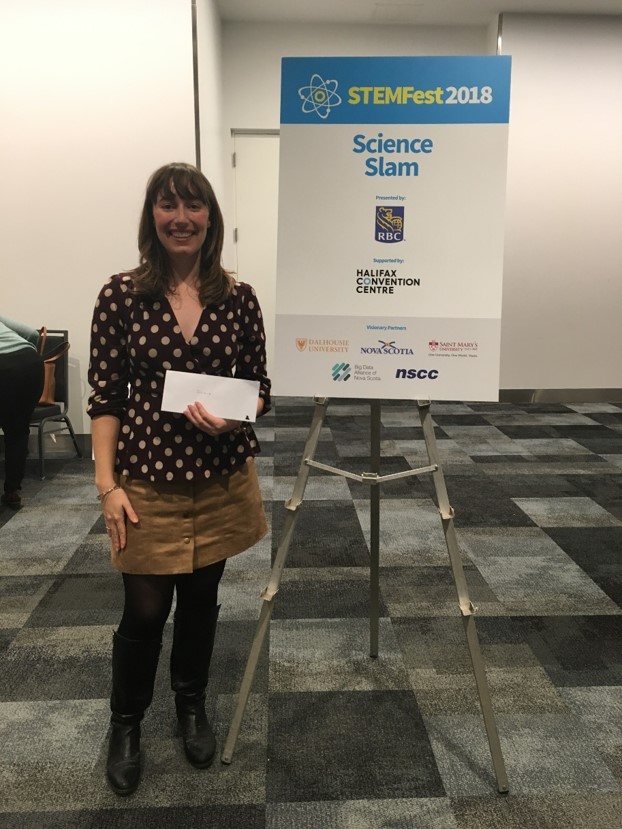 Congratulations to first year Speech-Language Pathology student Juliana McLaren, who came 2nd and received a prize of $250 in the 2018 Halifax Science Slam!
Congratulations to first year Speech-Language Pathology student Juliana McLaren, who came 2nd and received a prize of $250 in the 2018 Halifax Science Slam!
The purpose of the event is to present a scientific talk in five minutes to the general public.
Her talk, Have you heard about the link between dementia and hearing loss? was well received by an enthusiastic group of science enthusiasts of all ages.
First-year Student Kicks-off First Year with an International Conference
First year student Speech-Language Pathology Juliana McLaren (pictured) participated in the Workshop for Young Female Researchers in Speech Sciences & Technology (YFRS-2018), held on September 1st in Hyderabad, India.
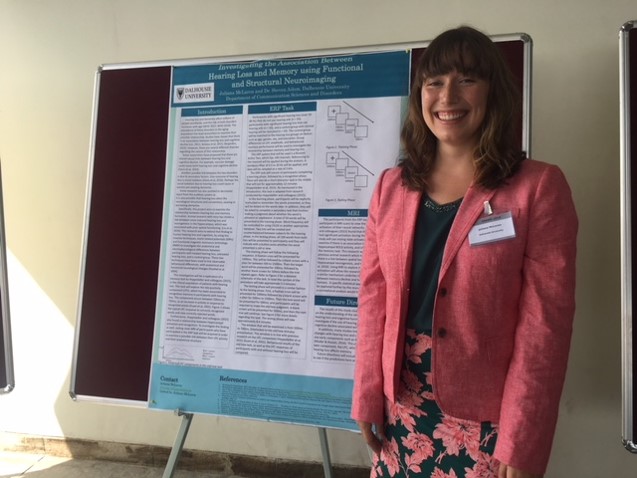
The workshop, which is organized in conjunction with the Interspeech conference, provides female Masters and Undergraduate students a chance to learn more about graduate studies in the speech sciences. At the workshop, Juliana presented a poster entitled Investigating the Association Between Hearing Loss and Memory Using Structural and Functional Neuroimaging.
The poster was an overview of her thesis proposal, which is under the supervision of Dr. Steven Aiken.
Third-year Speech-Language Pathology Students present at ASHA in Boston
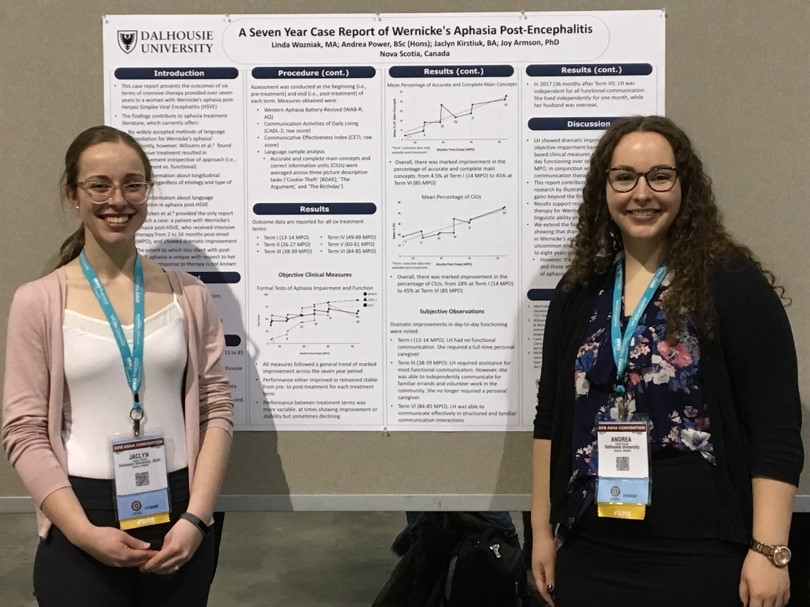 Andrea Power and Jaclyn Kirstiuk presented their research this November at the ASHA Convention in Boston, MA.
Andrea Power and Jaclyn Kirstiuk presented their research this November at the ASHA Convention in Boston, MA.
Their unique longitudinal case report follows the communication abilities of a woman with Wernicke’s aphasia post herpes simplex viral encephalitis (HSVE). She was followed for seven years, beginning at 13 months post-onset, in conjunction with six periods of intensive communication therapy. Consistent and marked gains in impairment-based and functionally-based measures were observed, as well as in day-to-day functioning. We contribute to the limited research on aphasia post-HSVE, showing the capacity for dramatic improvements up to eight years post-onset.
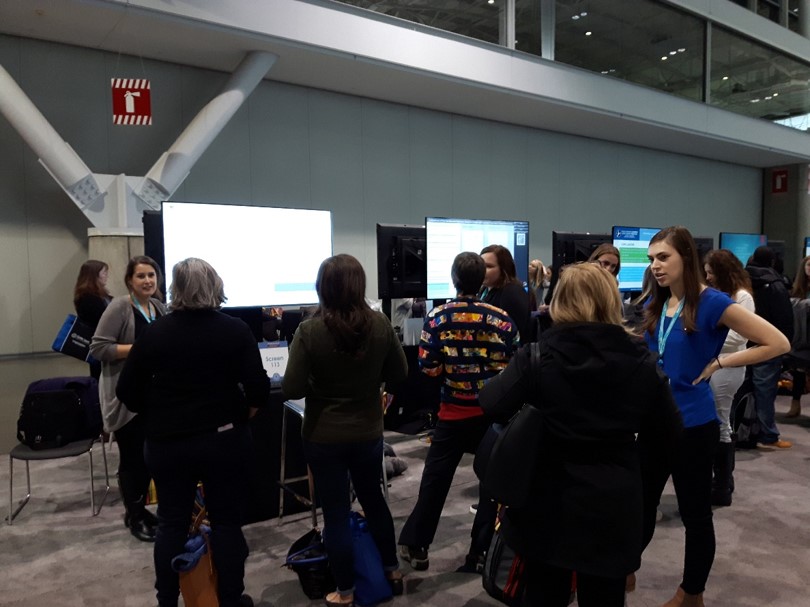 Sarah Anthony, Madeleine Leger, and Melissa Spence presented their research on An Intervention for Speech Intelligibility in Adults with Down Syndrome
Sarah Anthony, Madeleine Leger, and Melissa Spence presented their research on An Intervention for Speech Intelligibility in Adults with Down Syndrome
Poor intelligibility can adversely affect adults with Down syndrome and speech therapy programs are often unavailable. Thus, there is a need to study intelligibility interventions for this population. This study investigated a six-week, twice weekly intelligibility intervention for three adults with DS. Intervention focused on the implementation of a compensatory strategy (“slow and clear”) to increase intelligibility. Progress was monitored using pre-, post- and follow-up testing and weekly probes. Results demonstrate that six weeks of intervention can lead to improvements in articulation accuracy, overall intelligibility, and use of a targeted strategy in adults with DS. Interventions consisting of awareness training combined with focused articulation therapy can be effective in raising overall metalinguistic awareness and the ability to identify and repair communication breakdowns. The results underline the practical importance of providing therapy to this underserved population.
Dalhousie Audiology Students Bring Home the CAA University Challenge Cup... Again!
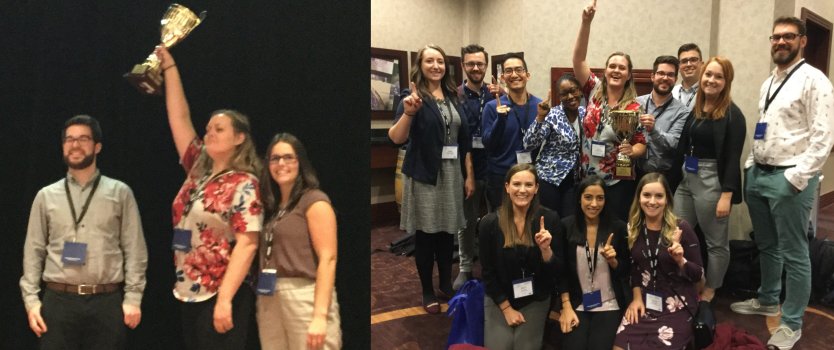
The Dalhousie Audiology Class with the CAA University Challenge Cup. To view the cup close up, visit the SCSD Reception Desk.
Congratulations goes out the to Dalhousie Audiology Class of 2019 who were awarded the University Challenge Cup at the 2018 conference of the Canadian Academy of Audiology (CAA). The class received the award for developing a promotional video called "A not so quiet place: Living with tinnitus".
Dal Hearing Aid Program gets Financial Boost
The Lion's Clubs of Nova Scotia have been huge supporters of the Hear@Dal (formerly Dalhousie Hearing Aid Assistance) program. Read more about their contributions to this wonderful cause.
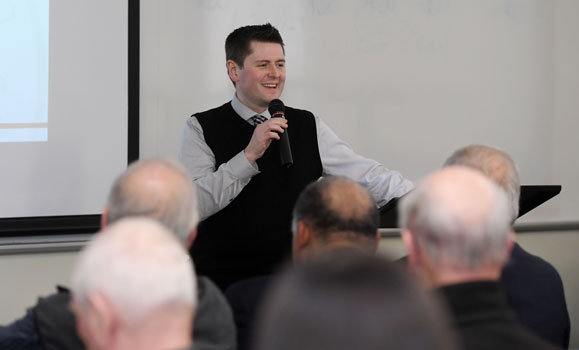
2017
Dalhousie Audiology Students Bring Home the 2017 CAA University Challenge Cup
Congratulations to Dalhousie's Audiology Class of 2018 who were awarded the University Challenge Cup at the 2017 conference of the Canadian Academy of Audiology (CAA). The class received the award for developing a promotional video about vestibular audiology.
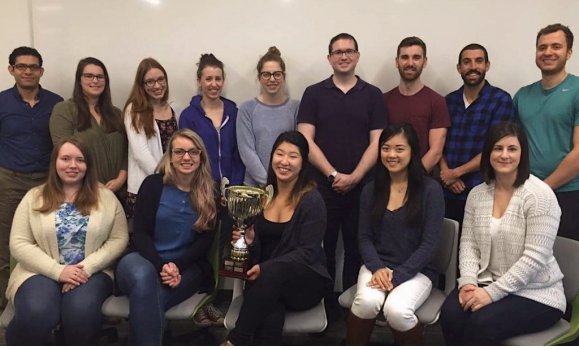
The Dalhousie Audiology Class with the CAA University Challenge Cup. To view the cup close up, visit the SHCD Reception Desk.
Dr. Ellen Hickey Launches New Book
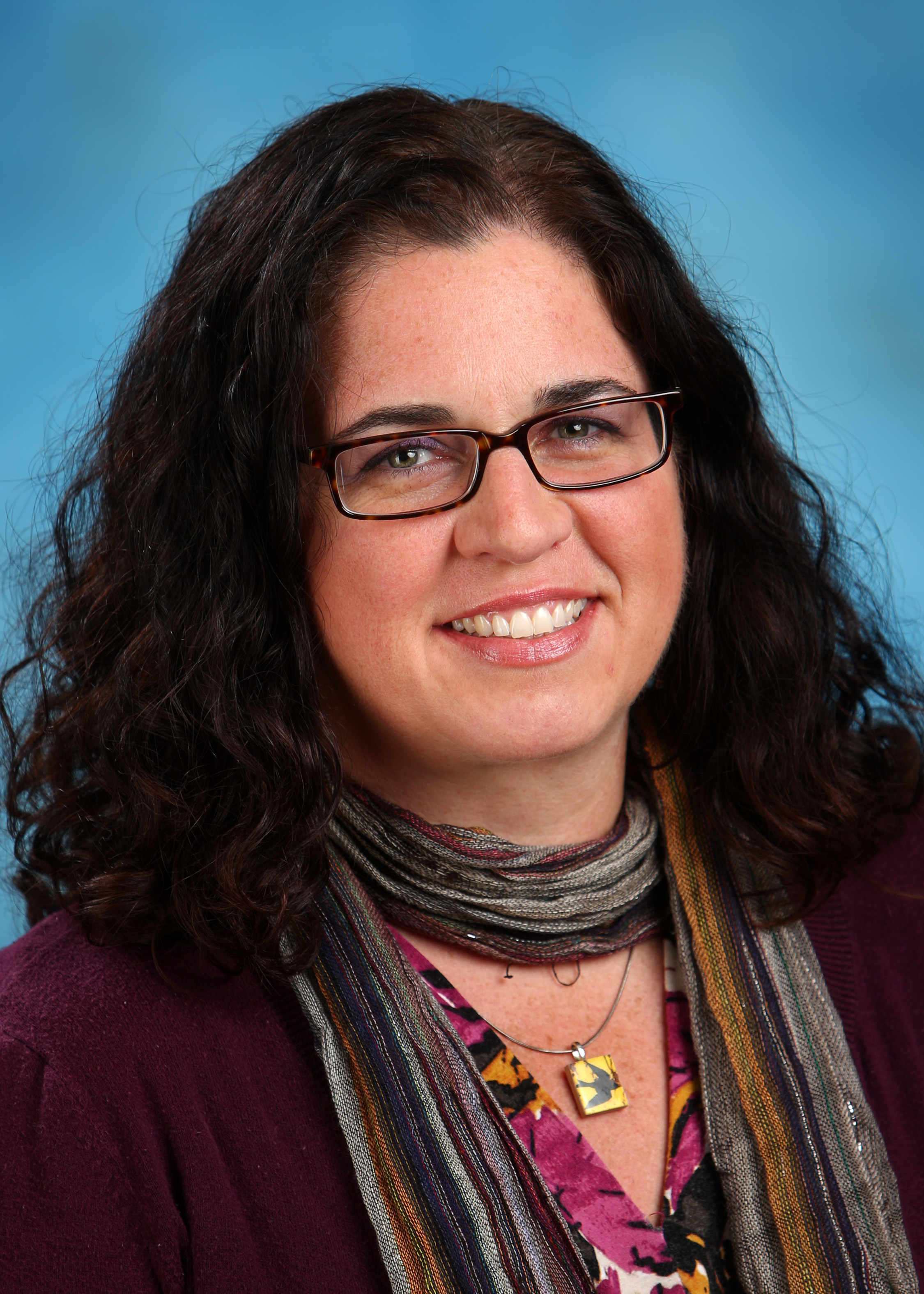 Dr. Ellen Hickey has completed the second edition of a book on dementia management, , with co-editor Michelle Bourgeois. While there is an emphasis on communication and the role of the speech-language pathologist, the book offers a broad review of interventions from a variety of disciplines. Evidence-based assessment and intervention approaches that promote meaningful life engagement for persons with dementia are described. The book is being published by Taylor & Francis, a division of Routledge, and is expected to be in print in late October 2017.
Dr. Ellen Hickey has completed the second edition of a book on dementia management, , with co-editor Michelle Bourgeois. While there is an emphasis on communication and the role of the speech-language pathologist, the book offers a broad review of interventions from a variety of disciplines. Evidence-based assessment and intervention approaches that promote meaningful life engagement for persons with dementia are described. The book is being published by Taylor & Francis, a division of Routledge, and is expected to be in print in late October 2017.
Infant Hearing Awareness Matters
 The Hearing Foundation of Canada, in conjunction with SHCD professor Dr. Steven Aiken, has launched an infant hearing campaign for the month of May. Hearing loss in babies is invisible, and many babies live for months or even years without a diagnosis. This can cause preventable and unnecessary cognitive and developmental setbacks. May is “Speech and Hearing Month,” the ideal time to approach the Canadian Government with our voices united on behalf of babies. Every baby in Canada deserves a chance to hear and to communicate.
The Hearing Foundation of Canada, in conjunction with SHCD professor Dr. Steven Aiken, has launched an infant hearing campaign for the month of May. Hearing loss in babies is invisible, and many babies live for months or even years without a diagnosis. This can cause preventable and unnecessary cognitive and developmental setbacks. May is “Speech and Hearing Month,” the ideal time to approach the Canadian Government with our voices united on behalf of babies. Every baby in Canada deserves a chance to hear and to communicate.
A 'Win-Win' for All
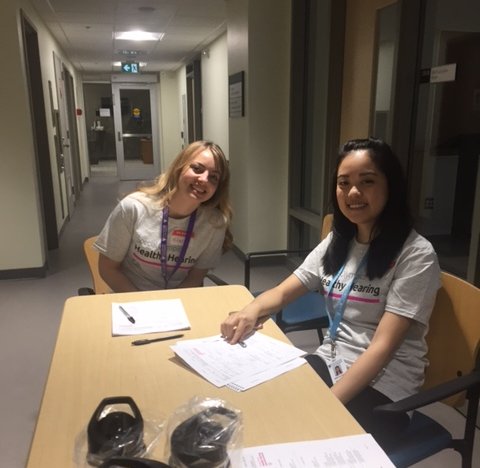
Hilary Buckle(left) and Shally Yuan, members of the 2nd year Audiology class get ready to greet the athletes.
Second-year audiology students from the School of Human Communication Disorders provided audiological assessment services to Special Olympics athletes on Saturday, March 25.
Antigonish audiologist (and School alumnus) Nadia Tymczyszyn, who received training in Philadelphia for the Special Olympics “Healthy Hearing” program this past year, provided overall supervision. The event was coordinated by Sport Nova Scotia’s Tom Fahie and Duncan Floyd from the School’s audiology faculty.
Interested athletes received a thorough assessment of their hearing systems. It was a “win-win” for all involved.
SHCD Welcomes Visiting Otologist
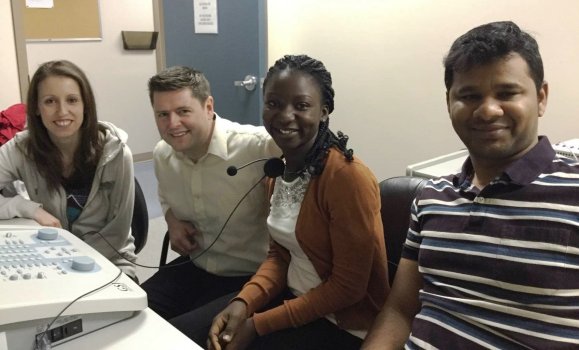
Shown in the photo (L-R): Lauren Dunphy (Research Assistant), Dr. Steve Aiken, Dr. Doreen Nakku, Dr. Ganesh Attigodu Chandrashekaran (Post-doctoral Fellow)
The School of Human Communication Disorders welcomed visiting Otologist Dr. Doreen Nakku in June for training in auditory electrophysiology with Dr. Steve Aiken. Dr. Nakku will be conducting a study investigating the impact of HIV on childhood hearing in her home country of Uganda using advanced audiological measures to distinguish and characterize auditory deficits stemming from disease processes and drug-related toxicity. This work is funded by the US National Institutes of Health (NIH).
Supporting Bilingual Children With Special Education Needs -- an interview with Dr. Kay-Raining Bird
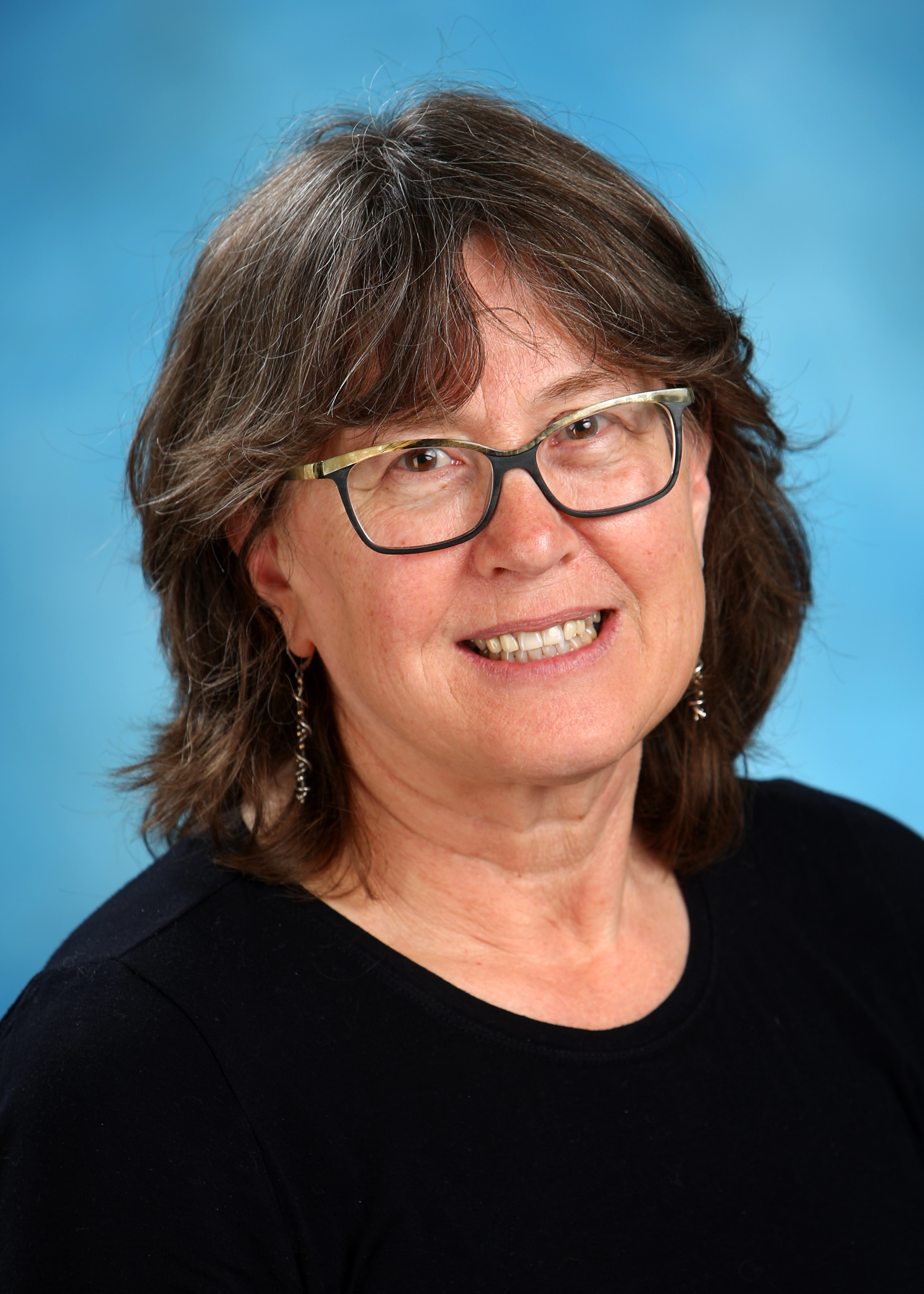 Dr. Kay-Raining Bird was recently interviewed by Francois Grosjean, an eminent bilingual scholar who does a blog for Psychology Today. The interview was published on January 18, 2017 on the . The editors of the blog identified it as an Essential Read, which Francois says has not happened with any post he has previously done.
Dr. Kay-Raining Bird was recently interviewed by Francois Grosjean, an eminent bilingual scholar who does a blog for Psychology Today. The interview was published on January 18, 2017 on the . The editors of the blog identified it as an Essential Read, which Francois says has not happened with any post he has previously done.
2016
Student Action Day Rally
 Student Action Day Rally - students Scott McGinley (left), Samantha Lenahan, and Sylvia Ciechanowski, along with Dr. Elizabeth Kay-Raining Bird (second from left) marched in the Student Action Day rally as part of the National Student Day of Action organized in part by the Dalhousie Student Union (DSU) on November 2.
Student Action Day Rally - students Scott McGinley (left), Samantha Lenahan, and Sylvia Ciechanowski, along with Dr. Elizabeth Kay-Raining Bird (second from left) marched in the Student Action Day rally as part of the National Student Day of Action organized in part by the Dalhousie Student Union (DSU) on November 2.
SHCD hosts ICPLA 2016
Dalhousie's new Collaborative Health Education Building served as the main conference facility as SHCD played host to the 16th ICPLA conference. Dedicated volunteers under the direction of Volunteer team lead Bonita Squires. The volunteer team included Peter Cahill, Alison Coldwell, Janine Fitzpatrick, Teba Hamodat, Erin Sparks, and Jab ran Umar. Mark Monk, the school's Receptionist and Website Manager worked with conference chair, Dr. Michael Kiefte on developing the conference's website as well as helping with other small aspects of the conference in the year leading up to the main event. For more information about the conference, please visit ICPLA2016.ca. Abstracts for the sessions can be found under Submissions.
The ICPLA Conference was the 3rd major conference to be held in Halifax in the last 12 months with a focus on Communication Disorders. The previous two conferences included Accoustics Week in Canada 2015 for the and the recent biennial conference of .
Basic Income Guarantee: The Time is Right
The Basic Income conference was a huge success. It was very well-attended, well-received. A tremendous thank you to SHCD students Karissa Izzard-Wells, Elspeth MacLachlan, Megan Jabusch, and Sarah Martin for their tireless work on Saturday, April 9, 2016, their decorum in introducing guest speakers and presenters, and their professionalism throughout. For more information, visit the .
Global Television was also present and recorded two segments from the conference:
- [video 6m 11s]
- [video 2m 4s]
Thank you to Dr. Elizabeth (Mandy) Kay-Raining Bird for the supplying the photo and links.
SHCD Students Awarded Prestigious Scholarships
Congratulations to SHCD Master’s students who were recently awarded prestigious scholarships for 2015-2016!
Peter Cahill was awarded the Killam Predoctoral Scholarship to for his thesis research on discourse genre and the development of complex syntax in dual-language learners. Dalhousie’s Killam scholarships support their “recipients to conduct outstanding research and make significant contributions to their intellectual communities.” Peter also received a Social Sciences and Humanities Research Council (SSHRC) Award and an honorary Nova Scotia Graduate Scholarship (NSGS) for the 2015-2016 academic year.
Janine Fitzpatrick was awarded a Nova Scotia Health Research Foundation (NSHRF) Scotia Scholar Award in the Medical Research Category to support her thesis research on verbal working memory and discourse comprehension in healthy older adults.
Karissa Izzard-Wells, last year’s recipient of the James Robinson Johnston Scholarship for African Canadians, received a renewal for 2015-2016 academic year.
Sarah Martin, a recipient of the Nova Scotia Graduate Scholarship (NSGS) last year, received a renewal of the NSGS for another year to support her thesis research on the experience of children with developmental disabilities in French Immersion.
Matthew Sebastian received a Social Sciences and Humanities Research Council (SSHRC) Award to support his thesis research, which explores gesture use and lexical facilitation in aphasia. He was also awarded an NSHRF Scotia Scholar Award in the Health Services Research Category.
Jennifer (Jennika) Soles received a Canadian Institutes of Health Research (CIHR) Award to support her thesis research on premorbid language assessment of bilinguals with aphasia. Jennika was also one of last year’s recipients of the Nova Scotia Graduate Scholarship and has received an honorary renewal for the 2015-2016 academic year.
Kegan Stephen received a Canadian Institutes of Health Research (CIHR) Award to support his thesis research on ribbon repair after noise-induced synaptic damage in the cochlea.
Ariane Tye was awarded the James Robinson Johnston Scholarship, which is offered each year by Dalhousie “to a promising African Canadian student.”
2015
Audiology, Speech-Language Pathology Act Introduced
On April 15, 2015, Hon. Leo Glavine, Nova Scotia Minister of Health and Wellness, announced the introduction of legislation to regulate our professions, . Shown here along with the Minister (3rd from left) are members Greg Noel, Pat Cleave, Heather Maessen, , and Joy Armson
Pat Cleave, professor in the School of Human Communication Disorders (SHCD), has chaired the SHANS Legislative Committee since 2010. This Committee is comprised of SHANS members who work in a variety of settings including the , , private practice, and the School of Human Communication Disorders. SHCD members of the Committee include Pat Cleave (chair), Joy Armson, Duncan Floyd, and Elizabeth Kay-Raining Bird.
SHCD Students Awarded Prestigious Scholarships
Congratulations to SHCD Master’s students who were recently awarded prestigious scholarships for 2014-15!
Karissa Izzard-Wells received the James R. Johnson Scholarship, which is offered each year by Dalhousie “to a promising African Canadian student”.
Sarah Martin, Jennifer Soles, and Emily McGuire were awarded Nova Scotia Graduate Scholarships to support their thesis research. These scholarships were offered for the first time this year by the Nova Scotia government.
2014
Getting the Word Out - SLP Student talks to The Coast ¶¶ŇůĘÓƵ Stuttering
SLP student Casey Kennedy began stuttering when he was seven. He knew right away what was happening—but no one else did.
As a child, Kennedy would instinctively use techniques like avoidance—not saying words he knew he'd stutter on—to hide his disfluency. The result was that no one believed he had a stutter, even his mother.
"It's actually really sad," says Kennedy. "Because basically what you're saying to yourself—and to other people—is that being fluent is more important than anything you have to say."
Diversity in Audiology
Awareness of diversity has always been a passion for SHCD alumna Jenifer Jackson. She writes about her experiences in the health care profession and the importance of diversity in her field, for the Canadian Audiologist.
Promoting the Power of Communication
“Communication, by itself, is a superpower. If you can communicate with people effectively, you can get places, and if you can’t it’s much harder…"
Carmen Lishman sits down with us to discuss the power of communication and what led her to pursue her Masters in SLP.
Award for Outstanding Leadership Named for SHCD Faculty
SHCD faculty member Pat Cleave has worked tirelessly to establish a PhD in Health at Dalhousie. Recently she was awarded the first ever Patricia Cleave Award for Outstanding Leadership! Read more about Pat's contributions!
Infectious Enthusiasm
Mark Monk signs off all his emails with the quote, “Enthusiasm is caught, not taught.”
Monk’s self-prescribed enthusiasm and dedication to his community were recently recognized by Halifax Regional Municipality. Monk was given an HRM volunteer award by Mayor Mike Savage at a ceremony last month.
Smart Talk - Atlantic Canada's first Accent Clinic
2013
Helping Break Down Barriers - New Accent Modification Clinic Opens
Accents are relative: we all have one when we talk, but the farther we get from home the more exotic it can sound to others. Accents can be a proud cultural identifier, but in some cases they can end up being a barrier to communication, resulting in difficult conversations and lost understanding.
To help individuals work through these barriers, the Dalhousie School of Human Communication Disorders (SHCD) has launched an in Halifax.
Though this sort of service has become popular in other major centres, the Dal clinic is the first of its kind in the Maritimes.
Through personalized programming, the fee-for-service clinic provides instruction on speech rhythm and pronunciation specific to the individual’s needs, goals and concerns. These can range from asking for a morning coffee order to industry-specific vocabulary for job interviews and business meetings.
“In the university context, students who have English as a second language often find they are understood,” explains Dr. Michael Kiefte, the clinic’s director. “However, in an off-campus setting, where listeners may not be as accustomed to hearing accents, these students often come up against additional barriers. It can be extremely frustrating and can create difficulties in social and employment situations.”
Working through sounds
The key word in the clinic’s title is “modification”: the goal isn’t to eliminate accents (since, of course, everyone has one) but instead to provide individuals with pronunciation techniques to better communicate with native English speakers.
The speech system has a sort of muscle memory: it’s trained to make sounds that we use most often. But different languages use different sounds, and speakers who learn a new language as adults may substitute sounds from their native tongue to make similar, but not identical, sounds in a new language.
That’s not a problem in and of itself, but non-native English speakers can easily find themselves in circumstances where their speech isn’t easily understood.
“Some listeners may focus on the accent, and not the words,” says Cindy Dobbelsteyn, a speech language pathologist with the clinic. “We had one student who never felt as if she was being heard because every time she started to speak, someone would ask where she was from instead of responding to what she had said.”
Xuesong Xie is one such student. A student in the Master of Environmental Engineering program at Dal, she came to the clinic because she felt her accent was detracting from communication.
“When you are not speaking the way someone who speaks English as their first language does, it seems to take a lot of extra energy for the person who is listening to understand,” she explains.
A personalized approach
Accents are incredibly personal, and the clinic’s programming is equally personalized. It’s based on an initial consultation and modified as the individual progresses.
“Because each language is different, and sometimes students have picked up incorrect habits [when learning English], we need to assess the source of communication difficulties, keeping the student’s specific goals in mind,” says Dobbelsteyn.
The individual is then given exercises to work on the speech problems identified. Typically, results are evident in 10 to 12 weeks.
Xie says that success in the program is much like learning a musical instrument: “You have to practice every day – at least half an hour. Eventually, the sounds become a natural part of your conversations.”
The benefits of the program can be exponential, as not only do students increase the clarity of their speech but their confidence grows as well. “Last week, after a presentation for a class, my professors commented that my speech was clearer than earlier presentations. I was much more confident and comfortable with speaking,” Xie says with a smile.
Making things clear
Both Xie and Dobbelsteyn reinforce that the clinic is about accent modification, not elimination. “From a practical perspective, it is impossible to eliminate an accent,” Dobbelsteyn notes. “Everybody has one”.
Xie offers a relatable pop-culture example from popular sitcom The Big Bang Theory, reinforcing the clinic’s goal of improving communication, not changing cultural identity. “Rajesh Koothrappali has an accent, but his English is clear. Everyone can understand him without putting extra work into it, and that’s what is important.”
As there are now more than 2,000 international students at Dal, many of the individuals the clinic helps are students, but the service is available to anyone who may be interested. While the clinic does charge for its services, many health-care plans such as Medavie Blue Cross and those provided by the Dalhousie Student Union will provide a limited amount of coverage for speech therapy services. (Details can be provided by your health-care service provider.) In addition to individual sessions, group sessions are also available with a lower fee.
For more information or to contact the clinic, or email speech@dal.ca.

